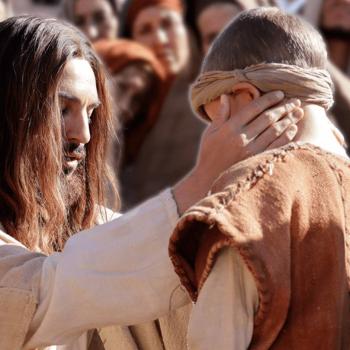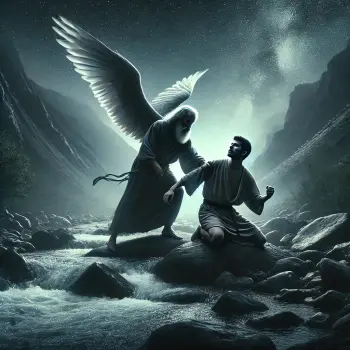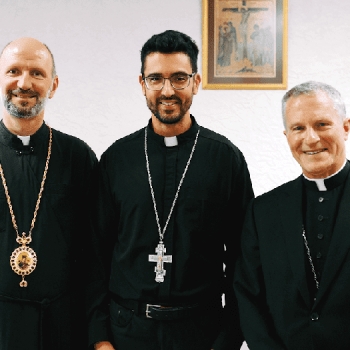The Anabaptists disagree, and they also can make a strong case that the peace that force brings is an illusory peace. But when you see how naked aggression can take life, liberty, and the fruit of one's work and one's hands from people, and you see as well that sometimes naked aggression is only restrained by principled, careful counter-aggression, it becomes difficult to say that you love your neighbor when your neighbor is threatened by evil if you are not willing to use measured force. That is what our military and other militaries, at their best, have done.
The second thing to say is that it is absolutely fascinating how, in both Iraq and Afghanistan, the United States military itself has undergone a tremendous shift in how it thinks about the use of power. The late 20th century was the era of the air force. It was the era of distant projected power through dropping bombs. Obviously we still do that, and we have these drones that in some ways achieve even more distance and precision than we have ever had. And yet these drones are being used in conjunction with a completely rethought counter-insurgency strategy that realizes that if we do not use our power to create and build, and not just to destroy, then we are very unlikely to achieve our goals.
The military is now led by generals who made their names by arguing that we cannot just think of ourselves as wielders of weapons. We have to be builders of local and indigenous leadership as well. So even the armed forces of the United States, which have unparalleled destructive power at their command, are realizing that to really achieve our goals we cannot merely destroy. We also have to build, and that's a very different kind of power and requires very different forms of learning and training.
James Davison Hunter recently published a book entitled To Change the World, which has created a great deal of discussion. Your review in Books and Culture is already a part of the canon on how that book is received. In a nutshell, what do you think of the call to "faithful presence" in light of your work on culture and power?
I think "faithful presence" is a good start. It's a lot better starting place than some of the other postures that we might take. It is a curious phrase, given the history of Christian participation in American culture, because it really was one of the watchwords of liberal mainline Protestantism in the 20th century. I did my master of divinity at a liberal Protestant seminary, Boston University School of Theology, and I remember hearing those very words used in classes on mission and faith and society. Christians are called to be a faithful presence, they would say -- not so much as missionaries as simply faithfully present in the midst of cultures, whether foreign or one's own culture.
It's hard to disagree with that. We should be faithful, and we should be present. But when you look at the effect that a Christian movement which had been shaped by that idea had on its society, it's very difficult to see that the society was more changed than the Christian community itself. That is, the Christian community was more transformed by being faithfully present in its society than the culture was transformed by having "faithfully present" Christians within it, or at least Christians who took that as their watchword.
I understand what Dr. Hunter is reacting to. It's the uninformed activism that has a "ready, fire, aim" mentality, that charges into cultural battles without a sense of commitment to serious preparation for reflection upon their presence in the culture. Obviously, faithful presence is an improvement over that.
But why would we expect to have different results from those that mainline Protestants had when they pursued that posture? It's a strangely passive phrase. To be present is good, but to what end? I would say that we are present first of all to cultivate, to discern what is good and preserve it -- and then to create.
When God creates humanity in the Garden, in the founding story of Genesis, it doesn't seem as though God only wants them to be faithful and present in the Garden. God also wants them to be fruitful and multiply and fill the earth. God gives them creative capacity and invites Adam to name the animals. Humanity's ultimate purpose is not just to be present in the world, but to be imaging a loving, creative God in the world. So faithful presence is a great start, but probably not enough to orient us to our true Christian responsibility to our culture, which I would say ultimately is to be creators of culture, not just present in culture.
You wrote the following: "A more practical question is what evangelicals might have done in the last century instead of retreating to the margins. A subcultural strategy can sometimes be wise -- if nothing else, it preserves an identity distinct from the dominant culture. I spent some of my formative years among mainline Protestants for whom ‘faithful presence' was the very watchword, but in practice that meant nearly complete cultural accommodation. This is perhaps the greatest practical obstacle to enacting Hunter's vision. Creating a strong alternative community to counter the dominant culture, while still boldly commissioning that community's members for presence even in places of great cultural power, has proven quite the sticky wicket for two millennia now."
What are your own thoughts on how to overcome that sticky wicket?
This is the other problem with the faithful presence idea. It may not do justice to the challenge of the faithful part. So the problem with presence is that it can easily be passive. The problem with faithful is that it is incredibly difficult to be fully present in a culture without being assimilated to that culture. This is the dilemma that the book of Daniel addresses most directly in the biblical canon. How do you find yourself at the highest levels of Babylonian culture without becoming captive at the level of your soul, your heart, your hopes, your fear? There may be no book more relevant for evangelicals in American society today than the book of Daniel.




